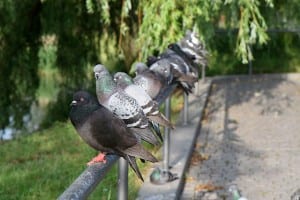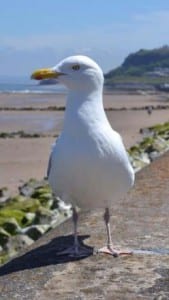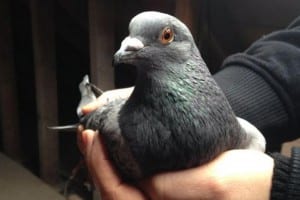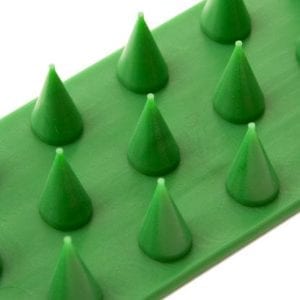
by Ryan Ponto | Aug 21, 2016 | Bird Netting
 At first, Sebastopol area resident Nancy Martin and her husband did not know what to make of the frequent booming bird noises they suddenly started hearing in mid-August.
At first, Sebastopol area resident Nancy Martin and her husband did not know what to make of the frequent booming bird noises they suddenly started hearing in mid-August.
Neither did their neighbors.
“We were walking around the neighborhood and we’d run into people, and they’d say, ‘What’s that noise we’re hearing?’ ” Martin said. “And we would say, ‘I don’t know, maybe hunting.’ ”
But the sounds were going off at very frequent intervals — sometimes as much as 20 per minute — and could last for 13 hours a day, Martin estimated. So hunting-related gunshots didn’t sound quite right.
Then a neighbor emailed with the most likely answer: bird cannons. Vineyards employ the noise-making devices powered by propane to scare away birds that may seek to prey on their valuable crop as harvest approaches.
The use of bird cannons is nothing new, particularly in agriculture-heavy Sonoma County, but Martin, who said she has lived in her neighborhood for 30 years, could not recall ever hearing them before.
“Sometimes, it would be back to back: you’d hear ‘boom’ and then another ‘boom’ right away,” Martin said. “My dog seriously was just shaking.”
Concerns expressed by Martin and several other residents in west Sonoma County highlight a familiar tension in agricultural areas: Growers, empowered by the county’s right-to-farm ordinance, are entitled to protect their crops, but local residents sometimes feel farming disruptions interfere with their quality of life.
John Balletto, owner of Balletto Vineyards and Winery in the Russian River Valley, said his vineyard has not used bird cannons this year because it has not felt very dramatic “bird pressure.” But he knows how bad it can get in other years: Balletto recalled one instance some 15 years ago when he had a 2-acre block of pinot grigio “picked clean” by waxwings.
The damage can add up quickly. A typical vineyard in Sonoma County yields about 3 tons of grapes per acre, or a crop valued at about $7,650 per acre at last year’s average price, according to the U.S. Department of Agriculture.
Balletto acknowledged that complaints from neighbors can arise, and he recommended taking an equally neighborly approach to resolving those conflicts.
“If you have a neighbor that has some concerns, just go have a conversation with that person,” Balletto said. “We’re still able to farm and do stuff, but it’s also important to try to have good neighbor relations.”
Cannons are not the only tool vineyards have at their disposal to defend against birds like starlings and waxwings. One popular option is bird netting, which growers can place over their crops to shield them from winged pests, but that can be a costly and labor-intensive route to take. Balletto said his vineyard is using bird alarms, which emit noises of predatory birds, and has found them to be more effective than cannons so far.
Still others employ actual birds of prey — falcons — to scare off hungry flocks.
With Wine Country’s harvest season gearing up, Lisa Correia, Sonoma County’s assistant agricultural commissioner, said last week that her office had yet to receive any complaints about bird cannons. But she said the commissioner’s office generally works closely with residents and businesses to resolve such issues.
“If somebody isn’t using (bird cannons) properly, then we can usually talk to the grower and get them maybe better educated or informed,” Correia said. “That usually helps create less of a chance of a nuisance being created.”
Solano County officials last year passed an ordinance regulating use of noise-making devices such as bird cannons for agricultural purposes. The ordinance spells out a number of requirements for the devices, including that they cannot be used more than 11 times per hour from 30 minutes after sunrise until 30 minutes after sunset.
Additionally, the ordinance allows for no more than one noise-making device for every 5 acres of land with crops needing protection from damage by birds or other wildlife. Devices within 50 feet of the property line need to be relocated at least 200 feet every four days, and they can’t be directed at residences closer than 400 yards away without rotating automatically and erecting a “sound baffle” between the residence and the device.
While Sonoma County does not have such an ordinance for noise-making devices, it does have recommended guidelines for propane cannons. A copy of the guidelines provided by Correia warns cannons “can and will annoy nearby residents and domestic animals,” and that if a field is surrounded by houses or has a “sensitive neighbor,” cannons may not be a wise choice, pointing to netting, falconry and “general harassment” as other options.
The guidelines further note that birds can rapidly adjust to the noise of cannons and recommend ways that growers should position cannons to maximize their effectiveness. The guidelines also say growers can mitigate noise by putting a plywood backstop behind cannons; warn growers not to use them before sunrise or after sunset; and suggest that the location of cannons be changed frequently and the interval between discharges vary.
Correia said the guidelines have been around for many years, in which time complaints about noise devices at harvest time have declined.
“Frankly, they’ve become a little less relevant because we don’t get as many calls these days,” Correia said. “It’s become less of an issue.”
The same may not be true for Napa County this year. Greg Clark, Napa County’s agricultural commissioner, said his office had heard more complaints about bird cannons than in the past few years, but he was not sure why. Clark said his county does not have a specific ordinance or written guidelines about bird cannons.
Clark said Napa, like Sonoma County, generally takes an educational approach to resolving disputes. That may mean, for instance, informing growers their cannons are firing too often.
Clark said he did not want to minimize the impact birds can have on crops, recalling one instance when a grower’s cannon was firing about every 20 seconds.
“While we stood there and talked, he would see the starlings flying around, and this person would say, ‘See the birds?’ ” Clark said. “You could have that thing firing off every second and the birds would still be there. They’ve gotten used to it.”
Still, Clark said some neighbors also may not fully appreciate what it means to move into an agricultural area, where disruptions, to a certain extent, come with the territory.
Balletto made a similar point.
“At the end of the day, there might be times when we disagree on things,” he said. “But if we don’t bring a crop in, nothing’s sustainable.”
About Pigeon Patrol:
Pigeon Patrol Products & Services is the leading manufacturer and distributor of bird deterrent (control) products in Canada. Pigeon Patrol products have solved pest bird problems in industrial, commercial, and residential settings since 2000, by using safe and humane bird deterrents with only bird and animal friendly solutions. At Pigeon Patrol, we manufacture and offer a variety of bird deterrents, ranging from Ultra-flex Bird Spikes with UV protection, Bird Netting, 4-S Gel and the best Ultrasonic and audible sound devices on the market today.
Voted Best Canadian wholesaler for Bird Deterrent products four years in a row.
Contact Info: 1- 877– 4– NO-BIRD (www.pigeonpatrol.ca)

by Ryan Ponto | Aug 20, 2016 | 4-S Gel Bird repellent, Bird Deterrent Products, Bird Netting
 A VIDEO has been published of a seagull attacking and eating a pigeon in Barrow town centre.
A VIDEO has been published of a seagull attacking and eating a pigeon in Barrow town centre.
The footage was recorded at around 6.30pm last night in Dalton Road, close to the junction with Cavendish Street.
Most types of seagull are ground-nesting carnivores, which take live food or scavenge opportunistically. There have been calls for action to be taken in Barrow to tackle the number of seagull in the town centre and residential areas.
Seagulls are a hot topic for debate around Barrow as many residents consider the birds to be pests or vermin. Others argue the birds are simply doing what is natural and that we should respect their presence.
Earlier this month, Barrow dad Phil Jackson said his four-year-old daughter will no longer visit the town’s park because of the aggressive nature of the seagulls near the pond. Mr Jackson believes drastic action needs to be taken to tackle the problem, which he believes is blighting the whole of Barrow.
About Pigeon Patrol:
Pigeon Patrol Products & Services is the leading manufacturer and distributor of bird deterrent (control) products in Canada. Pigeon Patrol products have solved pest bird problems in industrial, commercial, and residential settings since 2000, by using safe and humane bird deterrents with only bird and animal friendly solutions. At Pigeon Patrol, we manufacture and offer a variety of bird deterrents, ranging from Ultra-flex Bird Spikes with UV protection, Bird Netting, 4-S Gel and the best Ultrasonic and audible sound devices on the market today.
Voted Best Canadian wholesaler for Bird Deterrent products four years in a row.
Contact Info: 1- 877– 4– NO-BIRD (www.pigeonpatrol.ca)

by Pigeon Patrol | Aug 19, 2016 | Bird Netting, Pigeon Patrol's Services, Pigeons in the News
 Can pigeons save the world? Probably not, but an innovative pilot project in London is showing how they can help reduce your exposure to air pollution.
Can pigeons save the world? Probably not, but an innovative pilot project in London is showing how they can help reduce your exposure to air pollution.
The project, called Pigeon Air Patrol, was launched Monday in the British capital. Ten homing pigeons have been outfitted with small, lightweight backpacks containing air-quality sensors and released at various points across the city.
ADVERTISEMENT
On their return flights home, the pigeons transmit real-time data on levels of ozone and nitrogen dioxide, the main urban air pollutants. Londoners can plug in their location at the handle @PigeonAir on Twitter and receive an instant response from one of the pigeons, informing them of the pollutant concentrations they’re inhaling.
They can also visit the Pigeon Air Patrol site to view a live map of the birds’ flights.
“It’s a tool to inform citizens about their exposure to pollution so that they can improve their health and well-being by reducing those exposures,” said Romain Lacombe, chief executive of Plume Labs, the Paris company that launched the pigeon project.
“Urban runners, cyclists, people that are sensitive to pollution, parents with young children, and people with asthma can track how pollution will change throughout the day, so they can change their behavior to reduce the impact on their health,” he added.
London is one of the most heavily polluted cities in Europe, largely owing to diesel exhaust from vehicles. The foul air is linked to nearly 9,500 premature deaths in the capital. Worldwide, air pollution sends some 7 million people to an early death.
The idea of putting air monitors on pigeons came from Pierre Duquesnoy, creative director at the marketing and technology agency DigitasLBi. He submitted the idea to a competition launched last year by Twitter U.K., in conjunction with the London Design Festival, to find new ways to use the site.
Duquesnoy then partnered with Plume Labs, which helped develop the backpacks over the past two years, with support from Twitter and atmospheric scientists at Imperial College London.
“Over the last 10 years Twitter has been used in ways that we would never have imagined,” Helen Lawrence, head of creative agency development at Twitter, said in a statement. “Real time information direct to your mobile is hugely useful, but add pigeons into that mix and you’ve got something really powerful.”
Lacombe said the pigeon project complements Plume Labs’ Plume Air Report, which collects pollution data from stationary monitoring sites in about 300 cities in 40 countries and makes them available to residents in real time, as well as offering advice on what to do to avoid overexposure.
“Traditional sensors are very important, but unfortunately they require large investments, and they are not mobile, so you don’t capture how pollution changes from one street to the next,” Lacombe said. “That makes it quite hard to know what you’re being exposed to and what you can do about it.”
The London pigeon project will run for only three days, Lacombe said. “We are doing this to raise awareness of the health threats posed by pollution by capturing the imagination of the public, which is hard to do with pollution without strong messages.”
Plume Labs wants to put lightweight pollution sensors on people, with the mobile data they collect transmitted via Twitter. The company is using a crowdfunding site to recruit 100 Londoners to test the devices they move around the city over the next few months.
“One of the research teams at Imperial College London specializes in how personal information can help change individual behavior,” Lacombe said. “We’ll study how having these personal sensors helps reduce exposures and how they can help develop new policies using the data we collect.”
The company wants to make the mobile monitoring devices available on the open market. The current sensor, which testers must buy, costs about $113.
As for the pigeons, they might be used in other places to tweet real-time pollution data to people living in large cities.
“It would be quite interesting,” Lacombe said. “We don’t have plans to do that at the moment, but why not?”
About Pigeon Patrol:
Pigeon Patrol Products & Services is the leading manufacturer and distributor of bird deterrent (control) products in Canada. Pigeon Patrol products have solved pest bird problems in industrial, commercial, and residential settings since 2000, by using safe and humane bird deterrents with only bird and animal friendly solutions. At Pigeon Patrol, we manufacture and offer a variety of bird deterrents, ranging from Ultra-flex Bird Spikes with UV protection, Bird Netting, 4-S Gel and the best Ultrasonic and audible sound devices on the market today.
Voted Best Canadian wholesaler for Bird Deterrent products four years in a row.
Contact Info: 1- 877– 4– NO-BIRD (www.pigeonpatrol.ca)

by Pigeon Patrol | Aug 18, 2016 | Animal Deterrent Products, Bird Deterrent Products, Bird Netting, Pigeon Patrol's Services
 A pigeon poacher who grabs his prey by hand in a Soho park and sells them to Manhattan merchants claims he’s just a misunderstood bird lover.
A pigeon poacher who grabs his prey by hand in a Soho park and sells them to Manhattan merchants claims he’s just a misunderstood bird lover.
“I’ve been poaching pigeons on and off for about 40 years in New York City,” said the unapologetic poacher, who spoke to The Post on the condition of anonymity. “It’s pretty good money; I’ll make $5 a pigeon.
“I’ll sit on a park bench and throw out some food,” he continued. “Within seconds a bunch of pigeons will gather, and with both hands I’ll grab about five at a time around their necks and put them in a black garbage bag. I don’t use a net, my bare hands work fine.
“Pigeons are easy to catch,” the birdman explained. “When pigeons walk around, it’s easy for string to get tangled up around their feet. It cuts off their circulation. That’s why you see so many with missing toes.
“Those are the easiest to catch.”
He nabs his birds in broad daylight and occasionally encounters a disgusted animal-lover.
“I do get confronted by people who’ll come up to me and say, ‘What are you going to do with those pigeons?’
“Have sex with them,” is his usual retort.
“Then they’ll leave me alone,” he said.
The poacher explained how the pigeon market in New York City — home to an estimated 1 million of the birds — works: A client will call him to place an order for 10 to 20 pigeons, he said, and will place orders up to a half-dozen times a year. One order always comes right before the Chinese Lunar New Year.
‘With both hands I’ll grab about five at a time around their necks and put them in a black garbage bag. I don’t use a net, my bare hands work fine’
– pigeon poacher
“In Chinatown they will do a ceremony where they release the pigeons into the wild,” he said. “In their religion, they think it’s bad karma to take from the earth without replenishing it. So this is their way of replenishing the earth.”
Jenny Wong, a spokesperson for the Chinatown Community Cultural Center, claimed to have no knowledge of such a practice.
The poacher also said he sells the birds to “poultry markets” but would not name them.
He admits the pigeon-poaching black market often leads to the birds being sold to rural hunting and shooting clubs for target practice. But he claims he does not sell to those places.
The poacher, without a hint of irony, spoke of pigeons as rat-like creatures before blurting, “I’m a bird lover. I’m a member of the American Mason Pigeon Association.” The Post could find no such group.
Even no-kill birdnapping is a crime, legally and morally, say animal-rights advocates.
“It’s a Class A misdemeanor and it’s punishable for up to a year in jail and a fine of up to $2,000,” said Elinor Molbegott, counsel for the Humane Society of New York. “All birds, including pigeons, are entitled to protection.”
About Pigeon Patrol:
Pigeon Patrol Products & Services is the leading manufacturer and distributor of bird deterrent (control) products in Canada. Pigeon Patrol products have solved pest bird problems in industrial, commercial, and residential settings since 2000, by using safe and humane bird deterrents with only bird and animal friendly solutions. At Pigeon Patrol, we manufacture and offer a variety of bird deterrents, ranging from Ultra-flex Bird Spikes with UV protection, Bird Netting, 4-S Gel and the best Ultrasonic and audible sound devices on the market today.
Voted Best Canadian wholesaler for Bird Deterrent products four years in a row.
Contact Info: 1- 877– 4– NO-BIRD (www.pigeonpatrol.ca)

by Pigeon Patrol | Aug 17, 2016 | Bird Netting, Pigeon Patrol's Services, Pigeon Spikes
 A young man has lost his life after jumping into Lynn Canyon in North Vancouver and drowning in the fast-moving waters.
A young man has lost his life after jumping into Lynn Canyon in North Vancouver and drowning in the fast-moving waters.
The incident occurred at approximately 4:30 p.m. this afternoon when the man climbed over the safety fences and jumped off a cliff into the waters near the Lynn Canyon Suspension Bridge. He hung onto the rocks for quite awhile while rescuers were making their way down the cliffs, but he let go and was swept into the waters before anyone was able to reach him.
As the man has not surfaced for some time, the rescue effort has since turned into a recovery operation.
There have been a number of deaths in this area of Lynn Canyon over the last few decades, many from cliff jumping – the dangerous overconfidence of adventure seekers in their abilities to overcome mother nature. A Simon Fraser University student died in the same area on September 11, 2015 after drowning in a watering hole.
The water that runs through the canyon is frigid from snowmelt, even during the summer, and water levels can change swiftly. Rivers and creeks in the North Shore mountains will swell throughout the week as temperatures steadily climb towards the weekend high of 17°C.
About Pigeon Patrol:
Pigeon Patrol Products & Services is the leading manufacturer and distributor of bird deterrent (control) products in Canada. Pigeon Patrol products have solved pest bird problems in industrial, commercial, and residential settings since 2000, by using safe and humane bird deterrents with only bird and animal friendly solutions. At Pigeon Patrol, we manufacture and offer a variety of bird deterrents, ranging from Ultra-flex Bird Spikes with UV protection, Bird Netting, 4-S Gel and the best Ultrasonic and audible sound devices on the market today.
Voted Best Canadian wholesaler for Bird Deterrent products four years in a row.
Contact Info: 1- 877– 4– NO-BIRD (www.pigeonpatrol.ca)
 At first, Sebastopol area resident Nancy Martin and her husband did not know what to make of the frequent booming bird noises they suddenly started hearing in mid-August.
At first, Sebastopol area resident Nancy Martin and her husband did not know what to make of the frequent booming bird noises they suddenly started hearing in mid-August.


 A VIDEO has been published of a seagull attacking and eating a pigeon in Barrow town centre.
A VIDEO has been published of a seagull attacking and eating a pigeon in Barrow town centre.
 Can pigeons save the world? Probably not, but an innovative pilot project in London is showing how they can help reduce your exposure to air pollution.
Can pigeons save the world? Probably not, but an innovative pilot project in London is showing how they can help reduce your exposure to air pollution.
 A pigeon poacher who grabs his prey by hand in a Soho park and sells them to Manhattan merchants claims he’s just a misunderstood bird lover.
A pigeon poacher who grabs his prey by hand in a Soho park and sells them to Manhattan merchants claims he’s just a misunderstood bird lover.
 A young man has lost his life after jumping into Lynn Canyon in North Vancouver and drowning in the fast-moving waters.
A young man has lost his life after jumping into Lynn Canyon in North Vancouver and drowning in the fast-moving waters.